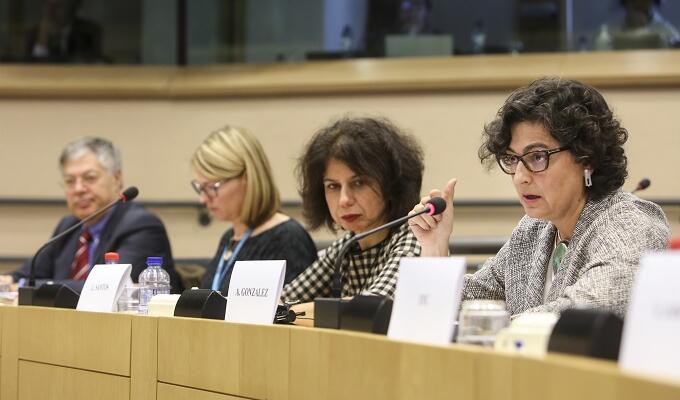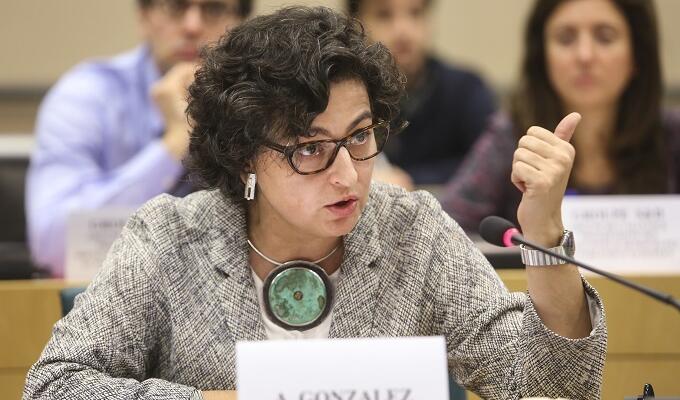

Eu’s Future Trade and Investment Policy (en)
Executive Director
International Trade Centre
at the
European Union Committee on International Trade (Inta) Public Hearing
12 November 2015-Brussels, Belgium
Thank you for inviting me to join you today for an exchange of views on the EU’s Future Trade and Investment Policy. I will do so by drawing from my own experience at the International Trade Centre (ITC), the joint agency of the WTO and the United Nations responsible for supporting developing countries to trade.
A trade policy is about making trade possible by levelling the playing field for economic operators.
The question that emerges is therefore what does levelling the playing field mean today? What does it entail? And how does the “Trade for All” policy measure up?
In today’s trade landscape, it is clear that levelling the playing field requires moving beyond tariffs. As traditional restrictions to trade relaxed, non-tariff measures involving regulatory, administrative and procedural requirements have become the major source of trade restrictions for businesses.
Levelling the playing field is about moving beyond goods and more towards trade in services, digital trade, e-commerce and promoting the mobility of professionals.
The Communication captures very well these dimensions, from the multilateral regional and bilateral negotiations perspectives.
Levelling the playing field today is also about placing greater focus and attention on small and medium-sized enterprises (SMEs) and ensuring that they can fully benefit from trade and investment agreements. SMEs are instrumental drivers of our economies, the titans of tomorrow and should be seen as more than the "mom-and-pop" shops that we find at the street corners. Globally, SMEs make up over 95% of all firms, account for approximately 50% of GDP and up to 70% of total employment, when both formal and informal SMEs are taken into account. This means between 420 million and 510 million SMEs, 310 million of which are in emerging markets.
And, when they trade internationally, SMEs are more productive, more profitable and create more and better paid jobs. Europe knows this fully well. With over 600,000 European SMEs trading in goods, accounting for one third of total EU exports and employing over 6 million people in Europe, SMEs play a significant role in EU international trade performance. SMEs – including women-owned SMEs which today represent only one in five exporting companies – are indeed the backbone of our economies.
The Communication is again on the right track by expressly recognizing the untapped potential of SMEs and the need to provide them with well-targeted support, starting with the right trade policy.
The driving force of SMEs in the global economy led the International Trade Centre to produce our first-ever SME Competitiveness Outlook just last month. The 2015 Outlook clearly demonstrates the catalytic role that SMEs have, particularly when empowered and equipped to do so through effective market access, good market and trade intelligence, e-connectivity, supportive national policies, conducive infrastructure and purposeful capacity building.
But, levelling the playing field today is more than just making trade possible. Trade cannot be disassociated from overall societal demands from protection of wildlife to fighting climate change to protecting human dignity. Trade must be responsive to consumer values and consumers today value fair, ethical and sustainably-sourced goods and services.
The Policy brings together coherently the efforts that the EU is already doing to promote responsible management of supply chains and sustainable trade schemes. ITC, which the Communication identifies as a key partner of the European Union in this endeavor, is working and will continue to work with the EU to ensure that value chains contribute to sustained and sustainable growth, here as well as in Europe's partner countries. And, for that to occur, it will be essential to ensure that the policies and schemes also contribute to greater value addition in your partner countries. It has to be good for Europe's economies, good for consumers and also good for your partners in developing countries.
The Policy’s commitment to include anti-corruption provisions in trade agreements is also very welcome. Corruption is a huge tax on SMEs, here in Europe as well as abroad. Corruption is quoted as a main non-tariff barrier in the NTM surveys that we conduct with businesses.
Again, making trade possible is not enough. We must also work to make trade happen.
This starts with implementing the agreements which are signed. The role of the European trade policy maker should not end the moment the ink on the deal is dry. It is precisely then that the bulk of the work should start in concert with businesses and trade and investment support institutions. This is as important in Europe as it is in many developing countries with whom the EU has concluded trade agreements. In particular, this includes providing detailed trade information on the terms of the deals by means of portals as we have done for the EU recently in Zimbabwe as well as in a number of Euromed countries.
It is well-targeted development assistance that will be the bridge connecting the trade opportunities with realities on the ground.
Europe is in a unique position to do that by combining the forces of its internal market, with the activism of its business and its development aid. The key to making trade happen in many of Europe's poorer partners lies in better combining these elements: trade, the private sector and development assistance. As an Organisation that focuses 70% of its actions in Sub-Saharan Africa, LDCs, SIDS and post-conflict states we know that more efforts are needed to build stronger markets and trade institutions in the South; to support value addition for jobs; and to promote investment in supply capacity. This is why we in the ITC but more importantly, your partners in these countries are eagerly awaiting the updating of the EU Communication on Aid for Trade and maybe even changing its title to "investing in making trade happen".
In the meantime, let me mention that the EU will have a first opportunity to demonstrate this by contributing to the replenishment of the Enhanced Integrated Framework, the multi donor trust fund aimed at helping least developed countries build their productive capacity, at the upcoming WTO Ministerial Conference in Nairobi in December.
Let me conclude with an area on which the communication is silent: the economic empowerment of women through trade. The International Labour Organization estimates that 865 million women around the world, also known as “the third billion”, if better supported could contribute more robustly to growth in our economies. Women-owned businesses represent an underutilised lever to boost competitiveness, accelerate business and sustain growth – one that requires greater attention from the EU both here as well as in your partners in the South.
To conclude, the EU Future Trade and Investment Strategy is a clear and concrete step in the right direction. It reflects and is aligned with new trade realities. The way forward therefore should be one focused on implementing this approach – to make trade happen and making it happen where it matters. ITC looks forward to working with the Commission to ensure this focus leads to trade impact for good.
Thank you.



